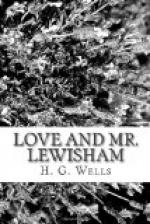He went striding heedless of his direction through the streets dotted with intent people hurrying to work, and presently habit turned his feet towards the Brompton Road. The eastward trend of the morning traffic caught him. For a time, save for a rebellious ingredient of wonder at the back of his mind, he kept his anger white and pure. Why had he married her? was the text to which he clung. Why in the name of destiny had he married her? But anyhow he had said the decisive thing. He would not stand it! It must end. Things were intolerable and they must end. He meditated devastating things that he might presently say to her in pursuance of this resolution. He contemplated acts of cruelty. In such ways he would demonstrate clearly that he would not stand it. He was very careful to avoid inquiring what it was he would not stand.
How in the name of destiny had he come to marry her? The quality of his surroundings mingled in some way with the quality of his thoughts. The huge distended buildings of corrugated iron in which the Art Museum (of all places!) culminates, the truncated Oratory all askew to the street, seemed to have a similar quarrel with fate. How in the name of destiny? After such high prolusions!
He found that his thoughts had carried him past the lodge of the museum. He turned back irritably and went through the turnstile. He entered the museum and passed beneath the gallery of Old Iron on his way to the Education Library. The vacant array of tables, the bays of attendant books had a quality of refuge....
So much for Lewisham in the morning. Long before midday all the vigour of his wrath was gone, all his passionate conviction of Ethel’s unworthiness. Over a pile of neglected geological works he presented a face of gloom. His memory presented a picture of himself as noisy, overbearing, and unfair. What on earth had it all been about?
By two o’clock he was on his way to Vigours’, and his mood was acute remorse. Of the transition there can be no telling in words, for thoughts are more subtle than words and emotions infinitely vaguer. But one thing at least is definite, that a memory returned.
It drifted in to him, through the glass roof of the Library far above. He did not perceive it as a memory at first, but as an irritating obstacle to attention. He struck the open pages of the book before him with his flat hand. “Damn that infernal hurdy-gurdy!” he whispered.
Presently he made a fretful movement and put his hands over his ears.
Then he thrust his books from him, got up, and wandered about the Library. The organ came to an abrupt end in the middle of a bar, and vanished in the circumambient silence of space.
Lewisham standing in a bay closed a book with a snap and returned to his seat.




